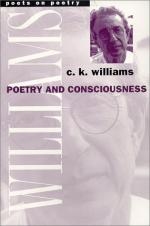|
This section contains 782 words (approx. 3 pages at 300 words per page) |

|
SOURCE: “Recombinative Poetry,” in Hudson Review, Vol. XXXVII, No. 1, Spring, 1984, pp. 115–31.
In the following excerpt, McDowell comments on the narrative modes of contemporary poetry and offers a favorable assessment of Tar.
If poets today are up to anything it may be this: recombinations of traditional strategies (or impulses) that define anew our relationships to timeless subjects—love, death, isolation, God and His godless double, anxiety, fear. Whether the poets know it or not, this recombinant impulse has its roots in what happened to narrative after the epic tradition waned.
Nearly twenty years ago, Robert Scholes and Robert Kellogg1 called our attention to narrative's post-epic division into two antithetical types: empirical, or realistic, narrative; and fictional, or idealistic, narrative. Furthermore, these branches could be subdivided: empirical narrative into the historical and the mimetic; fictional narrative into the romantic and the didactic. Though Scholes and Kellogg employed this framework to...
|
This section contains 782 words (approx. 3 pages at 300 words per page) |

|


